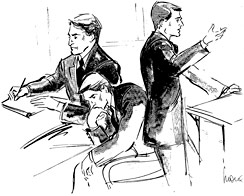Legal Issue in the Case of Yisroel Ebert v. Yeshiva University
Appellate Division, First Dept. 28 A.D.3d 325 (2006)
In the case of Yisroel Ebert v. Yeshiva University, the primary legal issue revolves around whether the petitioner, Yisroel Ebert, was denied fundamental fairness during the disciplinary proceedings that led to his expulsion from Yeshiva University. Ebert contended that the university’s disciplinary process was flawed and sought reinstatement through an Article 78 proceeding.
See also Article 78 Petitions in General
Facts of the Case
Yisroel Ebert, a former student at Yeshiva University, faced disciplinary action following an incident where he allegedly punched another student. To avoid expulsion, Ebert initially withdrew from the university. However, he later sought reinstatement through an Article 78 proceeding, which is a legal mechanism in New York for challenging the decisions of administrative agencies, public bodies, or officers.
The Supreme Court of New York County, presided over by Justice Herman Cahn, remanded the case for a new hearing. Following this hearing, Ebert was expelled from the university. Ebert then commenced another Article 78 proceeding, which was dismissed by the Supreme Court. Ebert subsequently appealed the dismissal, arguing that he was denied fundamental fairness in the disciplinary process.
Court’s Holding
The Supreme Court, Appellate Division, First Department, New York, held that Yisroel Ebert was not denied fundamental fairness during the disciplinary proceedings. The court affirmed the judgment of the Supreme Court, New York County, which had dismissed Ebert’s Article 78 proceeding seeking to annul his disciplinary expulsion from Yeshiva University.
The court found that the university had substantially observed its disciplinary rules, which were designed to provide a fair but informal process. The court noted that the university’s rules did not intend to afford Ebert the full range of due process rights typically associated with formal legal proceedings. The court also determined that there was no evidence of bias or animosity from the hearing officer, and that the hearing officer had considered the entire record before making a decision.
Applicable Law
The court’s decision was guided by several key legal principles and precedents:
- Fundamental Fairness: The concept of fundamental fairness in university disciplinary proceedings is not equivalent to the full panoply of due process rights. Private universities are required to substantially observe their own disciplinary rules, which may include informal processes and limitations.
- Substantial Observation of Rules: The court referenced previous cases, such as Matter of Fernandez v. Columbia Univ. and Matter of Al-Khadra v. Syracuse Univ. , to support the notion that substantial observation of disciplinary rules by the university is sufficient to meet the standard of fundamental fairness.
- No Per Se Rule for Different Hearing Officers: The court cited Liteky v. United States to emphasize that there is no per se rule requiring a different hearing officer on remand. The university is generally better suited to make decisions regarding its internal affairs, as supported by Maas v. Cornell Univ. .
- Credibility Determinations: The court upheld the hearing officer’s credibility determinations, noting that there was no basis for disturbing these findings. The court referenced Matter of Pelayo v. Safir to support the principle that credibility determinations in disciplinary proceedings should be respected unless there is clear evidence of bias or error.
- Hearsay and Inferences: The court acknowledged that evidence in school disciplinary proceedings may consist of hearsay and that reasonable inferences drawn from the record will be sustained if supported by the evidence. This principle was supported by Matter of Board of Educ. of Monticello Cent. School Dist. v. Commissioner of Educ. .
- Penalty and Fairness: The court found that the penalty imposed on Ebert was not shocking to the sense of fairness, given his disciplinary history and the fact that he was on probation at the time of the offense. The court referenced Matter of Kramer v. Kinney to support this conclusion.
Key Terms
- Yisroel Ebert v. Yeshiva University
- Article 78 proceeding
- disciplinary expulsion
- fundamental fairness
- Supreme Court, Appellate Division, First Department, New York
- disciplinary rules
- due process rights
- credibility determinations
- hearsay evidence
- school disciplinary proceedings
Conclusion
The case of Yisroel Ebert v. Yeshiva University highlights the legal standards and principles applicable to university disciplinary proceedings. The court’s decision underscores the importance of substantial observation of disciplinary rules by private universities and the limited scope of due process rights in such informal settings. The court’s affirmation of the university’s actions serves as a reminder that educational institutions are generally afforded deference in managing their internal affairs, provided they adhere to their established procedures and ensure fundamental fairness.
By understanding the legal framework and key precedents cited in this case, students, educators, and legal professionals can gain valuable insights into the complexities of university disciplinary processes and the standards of fairness that must be upheld.
